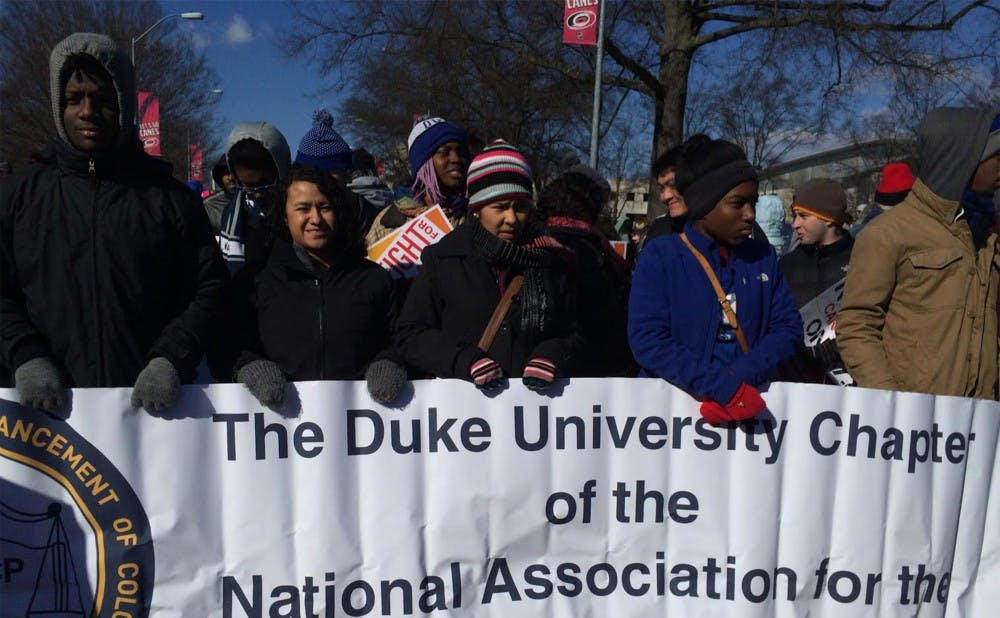A march in Raleigh for civil rights drew thousands of protestors to address a variety of social and political issues in the state.
People from across North Carolina came to Raleigh to participate in the 10th Annual Moral March on Raleigh, a movement focused on combatting voter repression and promoting issues of justice and equality. The march began in front of the Raleigh Memorial Auditorium, where religious leaders, artists and organizers spoke to the crowd. The protesters marched seven blocks and ended in front of the North Carolina Capitol Building, where speakers discussed different aspects of the “14-Point People’s Agenda,” which includes suggested reforms to voting procedures, housing, education, criminal justice and the environment, among other issues.
“I think the larger impact is energizing an electorate,” said senior Brenda Onyango, president of the Duke chapter of the National Association for the Advancement of Colored People. “The larger impact, especially having so many young people come, is people seeing how they can directly influence legislation and the process of writing policies.”
Among the speakers at the march—which was sponsored by the Historic Thousands on Jones St. People’s Assembly Coalition—was Michelle Laws, executive director of the North Carolina chapter of the NAACP, whose speech about the importance of the arts in social movements was followed by performances from poets and singers.
“We are alive and well because we’ve got some awesome cultural artists who are speaking loudly and doing their thing,” Laws said.
The Rev. William Barber II, president of the North Carolina chapter of the NAACP, said in his speech that supporters of all the presidential candidates were welcome, but explained that advocating for specific candidates was not the purpose of the march. Barber added he did not actively support any of the current candidates because they have not spoken out on voting rights issues.
“We do not endorse candidates.” Barber said. “We endorse issues.”
Some marchers still held up posters and signs in support of candidates, despite Barber’s remarks.
Protestors repeatedly chanted, “No justice, no peace” and, “The people united will never be defeated.” Another of the most common refrains was, “This is our Selma. This is our time. This is our vote.”
When the North Carolina General Assembly changed voting laws in 2013 to enforce photo identification, cut early voting by a week and eliminate same-day registration, many civil rights groups such as the North Carolina chapter of the NAACP have drawn attention to the impact of what some perceive as voter restriction.
Sophomore Rachel Thompson, health committee co-chair for the Duke NAACP, said she marched for voting rights and women’s health, for example in support of Planned Parenthood.
“Honestly, it’s a really large impact on the statewide level, just showing how communities can unite together to make their voices heard,” Thompson said.
Another major focus was youth involvement in advocating for these issues. Students from different universities, including Duke, the University of North Carolina at Chapel Hill and North Carolina Agricultural and Technical State University, participated.
Onyango noted that students should take advantage of the early voting polling site coming to the Freeman Center for Jewish Life on Duke’s campus.
Tyler Swanson, field secretary for the North Carolina chapter of the NAACP, spoke before the march, advocating for everyone to speak out on important issues for their generation.
“We have no time for foolishness when our voting rights are under attack,” Swanson said. “We have no time for foolishness when black lives are being attacked every 28 hours. We have no time for foolishness when our higher education is being sold to the highest bidder. We have no time for that. But, I can say this. We will win.”
Get The Chronicle straight to your inbox
Signup for our weekly newsletter. Cancel at any time.
Class of 2019
Editor-in-chief 2017-18,
Local and national news department head 2016-17
Born in Hyderabad, India, Likhitha Butchireddygari moved to Baltimore at a young age. She is pursuing a Program II major entitled "Digital Democracy and Data" about the future of the American democracy.

